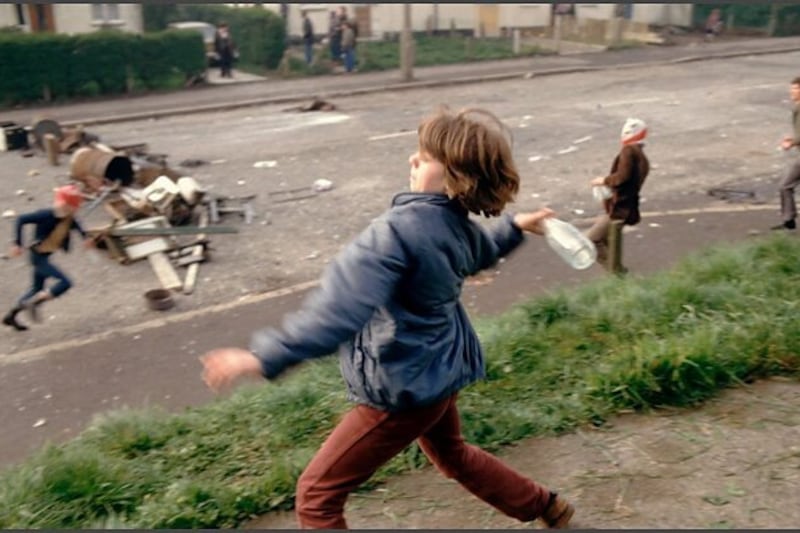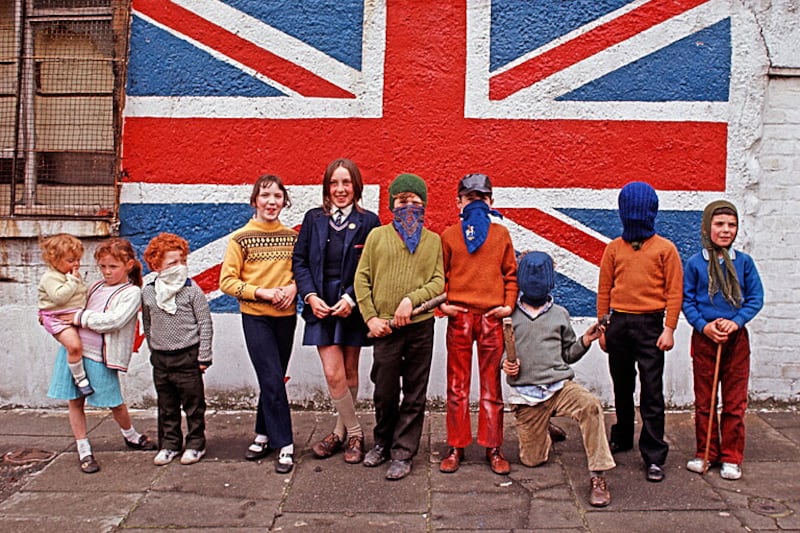"IT'S definitely made for an English audience that might have fatigue and a wilful apathy about the Troubles, which is shameful," says director James Bluemel when asked who his engrossing new five-part documentary Once Upon A Time In Northern Ireland is aimed at.
"It's also going to have a global audience, because it premieres in the United States at the same time as it does on the BBC."
Starting on Monday evening on BBC Two, it's a 'sequel' of sorts to the north London-born film-maker's award-winning Once Upon A Time In Iraq, in which Bluemel interviewed Iraqi civilians, American soldiers and international journalists to provide a harrowing overview of the 2003 invasion and its aftermath.
Once Upon A Time In Northern Ireland serves a similar function for the Troubles by allowing a cross-section of those who found themselves caught up in the conflict to share their stories during a chronological trawl through 30 years of sectarian mayhem.
Viewers will hear from IRA men who signed up in the wake of the Ballymurphy and Bloody Sunday massacres and were denied their political status when imprisoned, responding with blanket protests and hunger strikes, and the wives and children they left behind on the outside. They'll also hear from and families torn apart after their loved ones were 'disappeared' by the IRA.

Loyalists propelled into pledging allegiance to paramilitary organisations by the thundering sectarian rhetoric of Ian Paisley and the horrific scenes of Bloody Friday share their stories, as does a former British soldier who arrived in the north as a 'peacekeeper' before being injured in the ensuing conflict and the widow of an RUC officer murdered by the IRA just minutes after visiting her and their newborn son at the maternity ward.
Punk rockers who rejected sectarianism outright explain how they embraced music as a unifying escape route, and there are words from innocent parties on both 'sides' whose lives were violently altered simply because they were in the wrong place at the wrong time.
Many of those who Bluemel puts on camera have, to use a tired 21st century phrase, 'been on a journey' and become visibly uncomfortable when the director asks them to confront and explain the violence and hatred perpetrated by their younger selves.
However, 25 years on from the Good Friday Agreement and with deadly republican and loyalist violence once again in the headlines, there can be no better time to hear from former gunmen, angry young men with a cause who eventually embraced peace in the wake of experiencing and perpetrating awful violence.
"It's also made for a Northern Irish audience who might feel that they know this 'story' very well," comments Bluemel, who won a Bafta for his 2017 documentary on Syrian refugees Exodus: Our Journey To Europe.
"But I'm hoping there's stuff in there which will surprise that audience and present things in a way which perhaps they've not thought of before – especially when it comes down to relating to some of these characters.
"Perhaps they'll meet someone in the documentary and feel empathy for that person in a way that they thought they couldn't beforehand."

As former loyalist paramilitary and Paisley-ite James Greer puts it, at one point "planting a bomb was just another Thursday" for him as a teenage gun-runner. However, having enthusiastically signed up to the UDA at age 17 (in reality, he'd been 'tricked' into joining infamous loyalist killers the UFF), Greer narrowly avoided death when a device he'd been asked to transport exploded prematurely.
A subsequent stint in prison proved revelatory for the Belfast man when one fellow loyalist inmate cheerfully described how he had calmly shot a Catholic shopkeeper dead, then executed the shopkeeper's wife when she stumbled into the aftermath and finally attempted to murder their young daughter in a hail of bullets when she also appeared on the scene.
"I didn't sign up for the likes of that," recalls the clearly still horrified Greer.
"I went back to my six-man cell and swore to myself that I would never lift a gun again."
True to his word, Greer renounced the paramilitaries upon release and trained as a social worker. Now grandfather, he says he can't imagine ever handing a gun to his 17-year-old granddaughter.
"I can't imagine handing her anything apart from a strawberry f***ing milkshake, to tell you the truth," he tells Bluemel, ruefully.
"They know full-well that it's going to be emotional," explains the director of how he needs to earn the trust of his interview subjects prior to putting them on camera and encouraging them to recall often painful memories.
"They know it's going to be traumatic to revisit some of this stuff. So people don't tend to just to say 'yes'," They want to know who [you are] and why – what's your agenda? They don't want to open up until they understand the reasons why you're asking them to open up and until they understand what the benefits would be to opening up these memories, which, like you pointed out aren't easy things to delve into.
"I'll have done research, so I know what their story is. But often the first time I hear their story in any detail, is when we're sitting in that room together and it's being filmed. That's often the first time I hear their story in full."

As mentioned, Once Upon A Time In Northern Ireland includes a diverse range of 'characters' who share their Troubles experience. Some are already well-known in the north and sometimes internationally – Bernadette McDonnell, daughter of hunger striker Joe McDonnell, Outcasts leader Greg Cowan, Good Vibrations man Terri Hooley, Children In Crossfire founder Richard Moore, IRA bank robber turned author Ricky O'Rawe, Michael McConville, son of disappeared victim Jean McConville – others are 'unknowns' who have never been on camera before. But all are utterly compelling in their personal testimony of what they experienced.

"When you make a film, I always think that if you can find the right people to put in the interview chair, you've got a good chance of making something which can be really interesting and quite powerful," Bluemel tells me.
"So I spent a long time trying to get that correct, trying to find a diverse range of experiences from people who had that ability to really pull someone in when they're telling their story."
He adds: "The people that I interviewed for this series wanted to talk about their lives this way – they wanted this history to be told and they want to be heard. And I think it's our job to listen."

Perhaps the final word should go to one of its less well-known interviewees, Fiona: a former Miss Northern Ireland contender from a republican family in Derry, her brother, Jim, joined the IRA at 16 in the wake of Bloody Sunday. He was shot dead by the British Army four years later.
"I'm not a 'victim' of the Troubles – I survived the f***ing Troubles," explains Fiona of how the conflict impacted her life.
"I just feel really angry that so many people in this part of Ireland had to suffer the s*** that they did – be they Catholics, Protestants, policemen, soldiers and everyone in-between.
"I try not to think about the past, but my absolute truth is that I know Jim is dead. And for what?"
:: Once Upon A Time In Northern Ireland starts at 9pm on Monday May 22 on BBC Two, when all episodes will be available via the BBC iPlayer.








